Every time we bring up the name Final Fantasy in a conversation about games, it's likely that someone will make some reference to the seventh main title in the franchise: they'll talk about Cloud and his gigantic sword, or how they think Sephiroth is one of the best villains of all time, or will talk about how Final Fantasy VII is the best game in the franchise.
So, when I started the project of writing about electronic games and RPGs at Cards Realm, the first title that came to my mind was Final Fantasy VII, since the Remake and its sequels allow a variety of theories and other content regarding what we wait for the second part. Instead, I chose to start with Final Fantasy IX and its message about life's meaning, as it was the title that started my journey in this universe.
But still being the main and most famous title of the series, today I invite you on a journey about how Final Fantasy VII changed the video game industry and brought the RPG genre into the spotlight, in addition to the message that its narrative presents to us. However, due to its success, the universe of the title has expanded, with a movie, several spin-offs, books and even a Remake. Therefore, in this article, I will only be covering the Final Fantasy VII universe as it appears in the PlayStation 1 game.
The RPG that changed the video game industry
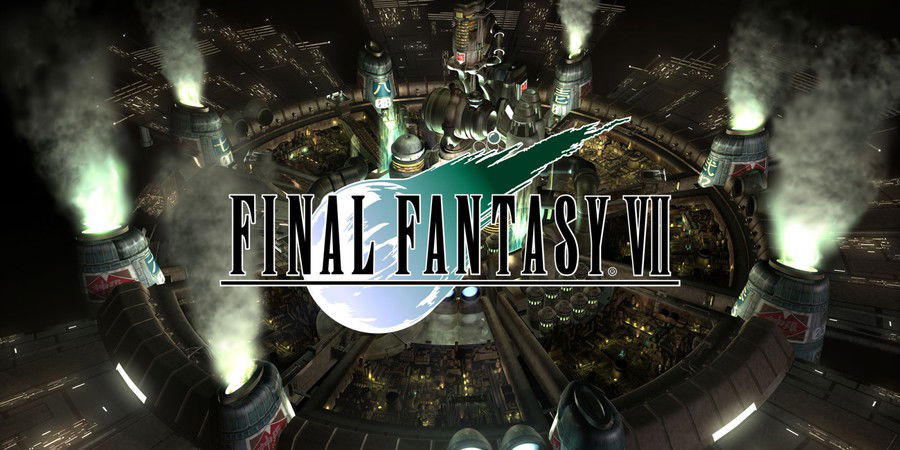
In case you don't know, Final Fantasy VII was a role-playing video game released by Squaresoft (now Square Enix) on January 31, 1997 for PlayStation 1, marking the end of the Nintendo era and starting the franchise's journey with Sony — that's a long story, and I'll probably try to cover it in detail in a separate article, but in short summary, Square's project for this title was too ambitious for the limited space of Nintendo's cartridges, leading the company to Sony's new console, which used CD discs.
This is the best-selling game in the franchise with over 13 million copies worldwide, and is available for PlayStation 4, Xbox One, Nintendo Switch, iOS, Android and PC.
Its plot tells the story of Cloud Strife, an Ex-Soldier from Shinra, a megacorporation that controls the world by monopolizing the delivery of electrical energy through the processing of Mako, a source extracted directly from the center of the Planet by reactors, making the company a sort of predominant and dystopian government situated in the great metropolis of Midgar.
Hired as a mercenary by the eco-terrorist insurgency that wants to save the planet Avalanche, Cloud teams up with the tough, foul-mouthed Barret Wallace and his childhood friend, Tifa Lockhart, to bomb Midgar's reactors. But the plan goes awry and Cloud, falling from one of the reactors into a church, meets Aerith Gainsborough, a slums flower girl that Shinra takes a particular interest in as the last survivor of a race known as the Ancients, who supposedly could guide the corporation to the Promised Land, a region abundant with Mako, where they intend to build their new capital.
Moments later, Cloud reunites with Avalanche, while Aerith is kidnapped by Shinra spies known as the Turks. The heroes head to the corporation's main building to save her, but their escape takes an unexpected turn when they find President Shinra's body, impaled with a gigantic katana that could only be used by a war hero presumed dead years before the start of the plot, Sephiroth — taking Cloud on a journey across the world chasing him, to settle the score of his past.
With unprecedented graphics for its time, an engaging story of approximately 40 hours, and a heavy investment in marketing with TV commercials and magazine posters, Final Fantasy VII left its mark on history by establishing itself as a masterpiece and an example to be followed that would leverage its market niche and make PlayStation the "home" of some of the best RPGs of all time, with an impact on narrative construction and story durability reverberated even in the most modern titles. It was a bold move by Squaresoft at the right time and in the right place, and the franchise's fanbase would likely not be the same if it weren't for the existence of this title.
What's in Final Fantasy VII?
In 2022, we can easily argue that Final Fantasy VII is the least visually developed of the franchise's 3D titles, but let's be honest: it pioneered the PlayStation generation, being years ahead of its predecessors — even with those "Lego blocks" graphics outside the combat environment.
The first novelty of Final Fantasy VII, as soon as you press the New Game button, is the transition between cutscene and gameplay without resorting to the loading screen, introducing you to the game's environment, giving you a hint of the world where you are, to then give you control of the protagonist.
A few seconds later, it directs you to the first battle, demonstrating that these "block graphics" are just a proportional element for navigation. During combat, characters gain improved visuals and more realistic proportions. Cloud wields a giant sword against two Shinra soldiers, and for the first time, Final Fantasy has multiple camera angles along with numerous character and monster movements patterns.
To attack, Cloud runs towards the enemy instead of just walking forward and swinging his weapon twice as in Nintendo titles, just as enemies run towards him during the attack, unlike the "blinking" in previous games. Each party member now has a distinct victory pose that made them visually unique, and the news didn't end there: the camera pans to show the surroundings before combat begins and emphasizes an enemy when they use a special attack, and the visual impact of Magics was breathtaking and made each combat, despite time-consuming, seem dynamic and epic, demonstrating that Final Fantasy had arrived with everything in the generation of 3D games.
Despite all this visual dynamism, it was still an RPG, so all this action had a degree of strategy that ran mainly through the equipment section.
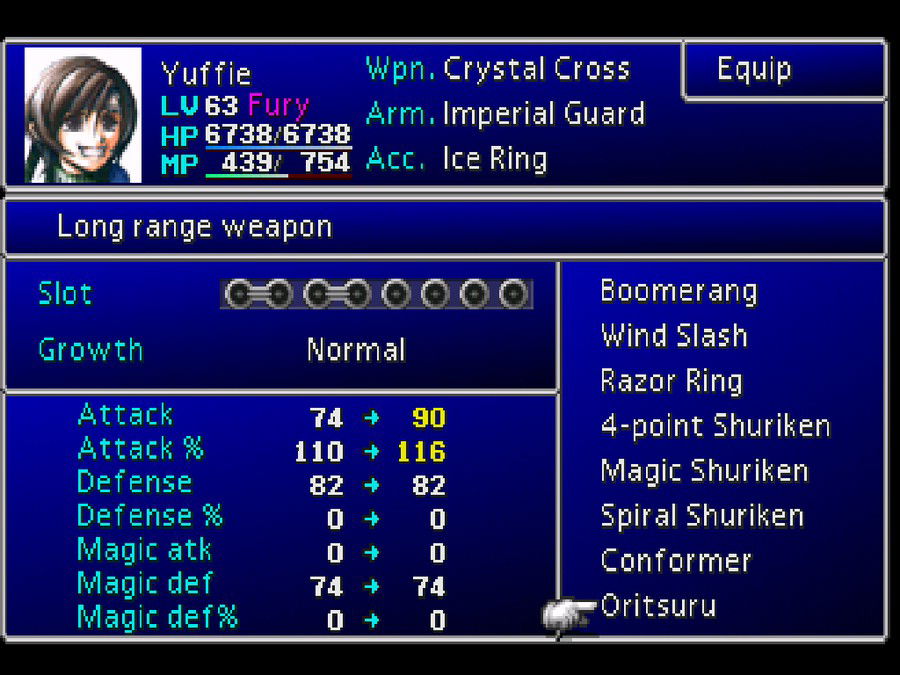
On the one hand, Final Fantasy VII simplifies this element by reducing the equipment to just three: Weapons, which increase the character's attack power and occasionally add other values, such as increasing damage if you have a downed ally. Armlets are the "armor" of this title, increasing stats such as physical and magical defense, evasion and can also provide other advantages, such as reducing the damage of a specific element, and an Accessory, used as an extra support for any need — whether by boosting your strength with Power Wrist, or granting protection from a troublesome status, like White Cape.
However, where the FFVII setup layer of complexity really expands starts with the Slots present in its weapons and armlets. These are where you'll equip the Materias, Mako crystals that basically grant all your characters' abilities - Magic, Summons, commands like Steal or Throw, and even additional effects like expanding the scope of your spells to all allies/enemies, increasing your base HP, or using more than one item per turn are tied directly to the Materia system.
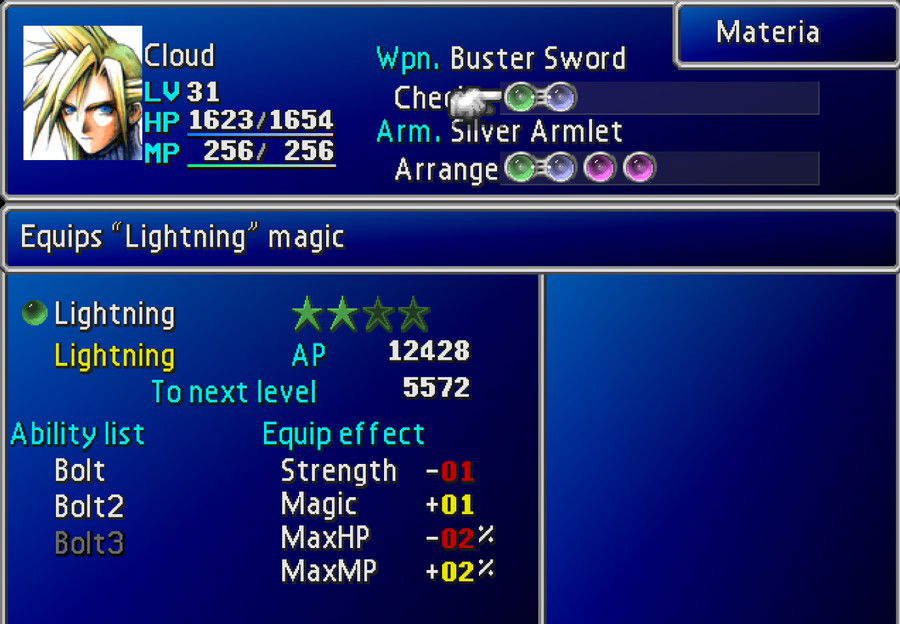
It works like this: each weapon and armlet has Slots, and you equip Materia in that slot to gain access to spells and other abilities. However, each equipment have a different slot distribution, with a greater or lesser number of them, connecting them to each other, or separating them and even the growth rate of a Materia differs from one item to another. That is, to obtain an efficient progression, it is necessary to consider not only what are the best equipment available at any given time, but also how they influence the setup of your Materia, since most battles will be resolved through them.
The Materia Menu is pretty simple: you have five different types represented by colors — Magic (green), Summon (red), Command (Yellow), Support (Blue), Independent (purple) — and you distribute them among the slots of the way you prefer. But their positioning is essential because of the Support Materias, which add some extra effect based on the spell or command it is connected to.
For example, an All Materia, when connected to a magicl Materia like Restore or Lightning, allows you to cast Bolt targeting all enemies on screen, or Heal to restore all allies' HP, and there are a multitude of variants where these complementary effects make a huge difference, especially with buffs like Haste or Barrier.
However, the complexity of this system doesn't end there. Each Materia changes the stats of the character equipped with it — for example, Steal increases your Dexterity, while a stronger Summon like Bahamut decreases the equipped character's HP and Strength, but increases their MP and magic — and to balance things out and avoid turning your team into a repertoire of mages, the Materia has its own leveling system based on the amount of AP you get in each battle, and when it gains a level, it becomes stronger: Lightning Materia on level 2 allows you to cast Bolt 2, HP Plus increases your total HP by an additional 10% for each level gained, and a Summon can only be used during a battle a number of times corresponding to your current level.
So, as you can see, there is a lot of planning for combat in Final Fantasy VII, and this is one of the most fun aspects of the game, as you can, during a battle, visualize the success or failure of every decision you made in your setup!
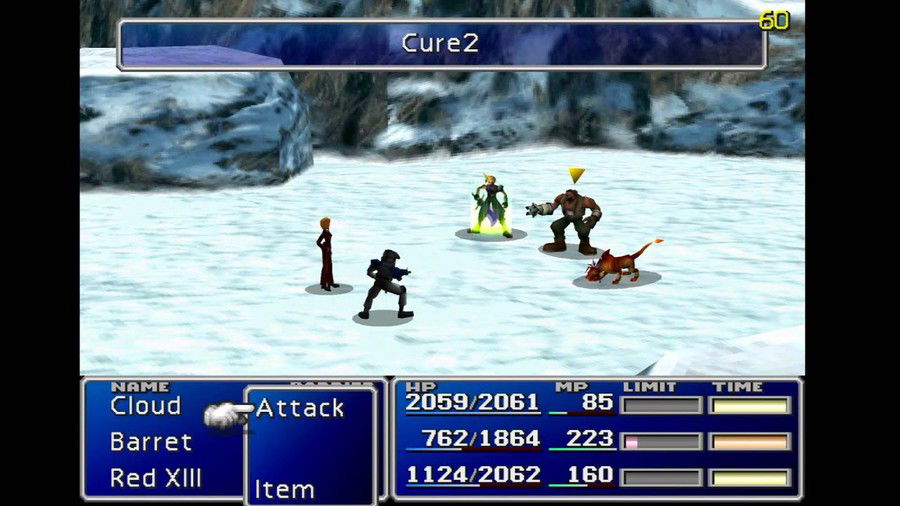
Combat in FFVII follows the same pattern of its predecessors since Final Fantasy IV and of some of its successors with the Active Time Battle — a more dynamic proposal of the turn-based system where you follow the growth of a bar until you can execute a command with that character. For agility purposes, you normally spend these turns with spells against normal enemies to save time, as monsters don't appear on the exploration screen, and most battles spawn randomly as you walk through dungeons or on the World Map, an occasionally tiresome element considering modern RPG generations where monsters appear in the halls and maps, and you can decide whether you want to face them or not.
There is a good and a bad side to the fact that each character can play any role in your Party: on the one hand, this makes none of them mechanically unique outside their Limit Breaks — a kind of special attack available when you take enough damage to fill its gauge. On the other hand, the idea of designing your team the way you prefer to make them equally efficient rather than each performing a specific role, such as "Cloud attacks, Aerith heals and Barret supports" is undeniably attractive.
*Having this flexibility with the Materia system lets you build your characters the way you want, without being stuck with one of them merely because one performs a certain function better than other characters. This lets you choose the ones you most identify with or like the play style and Limit Breaks — it's the opposite of, for example, having to constantly rotate your Party like in Final Fantasy X because each one is better against a different category of enemies, which has its advantages such as making everyone count in combat, but it also forces them to take longer than it should.
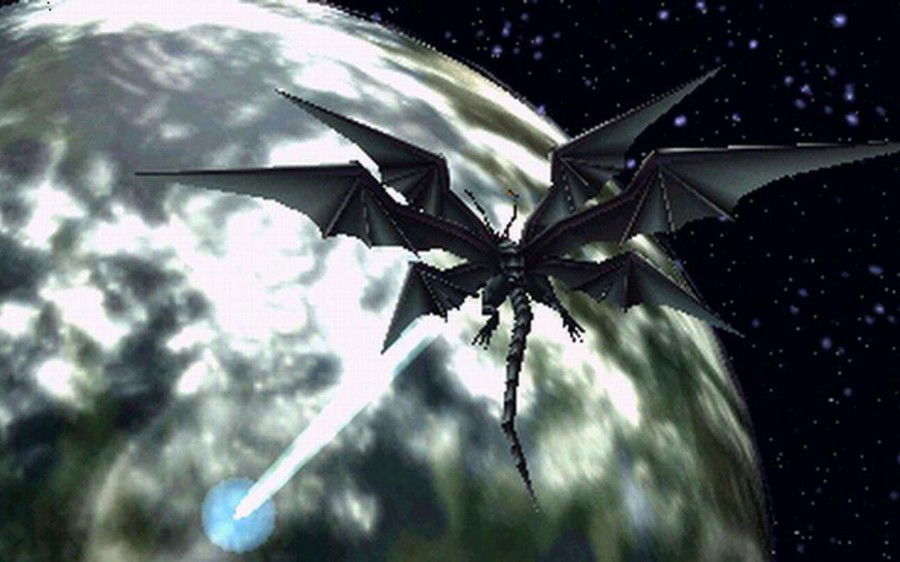
But FFVII is not a perfect title and its first flaw is that the main plot isn't very challenging, just having a basic understanding of the game mechanics and avoiding running away from random battles to succeed in the campaign. It's not designed to make you think hard: being often rewarding to just swap out your weakest equipment for your strongest, and replace weaker Materia—especially Summons—with more efficient spells. There is no downside or consequence for going this route, while trying to break away from this conventional idea is of no benefit.
That's not necessarily a bad thing: a game that makes you feel rewarded for "playing naturally" is a great way to keep a person engaged from start to finish without the need for overly complex or confusing choices, and it doesn't lack entirely about challenges — the Weapons, secret bosses found in the later stages of the game, are where you really need to think and plan your setup and characters well before attempting a battle.
However, the worst part of FFVII is how silly some of its plot devices are because many of them don't make any sense and were clearly added only to prolong and move the story. Things like having to do a squat competition, participating in a Chocobo race to get out of prison, or worst of all: the time a boy conveniently gives you a snowboard for no reason because he got hurt, and you picked up a map on the wall of a bar. That's it, the boy decided to give his Snowboard to a stranger because sure, why not?
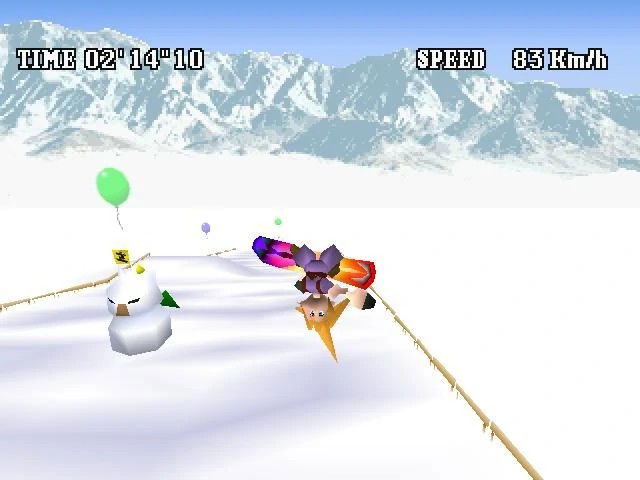
In fact, I think the worst silly moment is actually when you have to climb an electrical tower... by jumping off a leaping dolphin. Anyway, the point is that despite portraying an incredibly well-written plot, the game has several moments that put you in meaningless silly situations to move the story that challenge you to take it seriously.
Despite these points and the weak development of some characters, FFVII is a solid experience that survives well in the test of time with a story involving matters tangible to our reality.
About the Game
A strong narrative about Environmentalism and the power of Megacorporations
It is common for games to address real and important topics based on metaphorical narratives, or by simplified means based on Hollywood plots, such as attempting the solution by just defeating a bad guy who is, for some reason, the main source of that problem. By doing so, writers allows themselves to present a point in our real world and seek to demonstrate its consequences, while betting on an easy way out of its outcome to avoid delving too deeply into the causes of that problem in our tangible and complex reality.
As an example, let's talk about another game that initially addresses the same theme as FFVII, but in a subtle and less expository way, Final Fantasy V: its narrative uses the famous search for crystals to demonstrate a world where they — sources of energy tied to the forces of nature — are used for so long by people to make their lives more comfortable to the point that they shatter and unleash a powerful evil while the world gradually withers in their absence— it's a metaphor where the planet is suffering and endangered by human actions.
Final Fantasy VII has several themes - environmentalism, dystopian governments, the meaning of life, and being defined by grief are its main ones. And as far as environmentalism is concerned, its message is conveyed clearly through a world built exclusively to address and connect all the plot's focal points.
In it, the Planet is a living entity. All living beings are born from it and return to it when they die, taking with them all the knowledge and experiences they acquired to be part of the Lifestream, a cluster of spiritual energy that will continue to give life to other beings in an eternal cycle. That is, although the body perishes and ceases to exist, the spirit returns to this flow of energy to be part of the manifestation that gives rise to other lifeforms.
Lifestream is a metaphorical interpretation of spirituality concepts for questions like "Where do we go after we die?". But when the product that Mako's reactors condenses and then discards to produce the source of electricity with which the whole world sustains itself and needs, is precisely this spiritual energy that carries the souls of the departed and gives life, Final Fantasy VII is directly saying that by using a planet's resources indiscriminately for our comfort or profit, we are killing it and denying future generations the gift of a good life — A powerful, contemporary message about environmentalism and the risks of using natural resources for our convenience, launched in 1997.
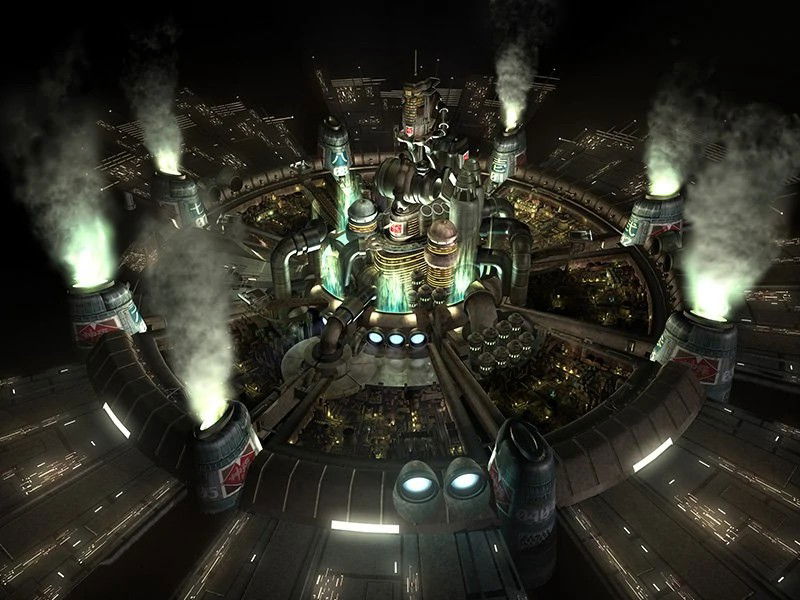
Of course, its cultural context is very different from ours: the metaphor presented in the game in relation to reactors, energy and a weapons megacorporation literally killing the planet for profit refers much more to Japan's historical issues with nuclear power, rather than concepts we know today, such as global warming.
Another way the game portrays the issue of nuclear development is by presenting how an out-of-control arms progress eventually leads to tyranny: Shinra Electric Power Company is a megacorporation with worldwide influence based on a monopoly of the main source of what no one can live without. Therefore, it has irremediable control over the social and political structure of the world through propaganda and media manipulation, and it has an advanced military structure to resolve insurgencies based on massacre or genocide.
That is, the existence of Shinra in Final Fantasy VII is the materialization of a dystopian world where mega corporations expand to the point of overtaking governments and controlling the world for themselves, with unchecked power to make any decision in favor of maintaining the social hierarchy above the collective well-being or the lives of the underprivileged, as demonstrated during the destruction of Sector 7.
Interestingly, despite the way it is portrayed and being directly responsible for the evils of the world, such as the monsters' increase and even Sephiroth's origin, the game doesn't attempt to portray the characters of its highest hierarchical scale as the "great villains". In fact, most of them are stereotypical caricatures of greedy superhero movie characters of the time.
The plot presents Shinra as the biggest cause of collective suffering in its universe, but avoids the idea of trying to present them as an evil that can be dealt with, despite it being the easy way out that the story could have: the moment in which Cloud finds President Shinra dead could be the outcome of the corporation's arc, as the protagonist's focus shifts to Sephiroth.
But instead, with the plot now being driven by the search for the villain as the party leaves Midgar, Final Fantasy VII goes on to show through world expansion and city-to-city travel how the relationship of ordinary people with Shinra is a systemic issue whose solution is beyond the hands of a small group of heroes — and by making the problems of its world avoid simplicity, the game helps us to reflect on the problems of our reality without presenting an unrealistic way out of them.
Visually iconic and well-developed characters
The first highlight when we elaborate on characters is the visual aspect of them in their concept arts, since they don't look much like what we've seen in previous games in the franchise and fit well in the world they were assigned to: FFVII bets on making the characters look cool to fit this transition to the 3D world, with a spiky-haired guy and a giant sword, women taking roles that go beyond royalty or mage stereotypes by putting them in the role of a fighter and a ninja, besides being the first Final Fantasy to have a black character, a "robot" and a quadruped animal at the party.
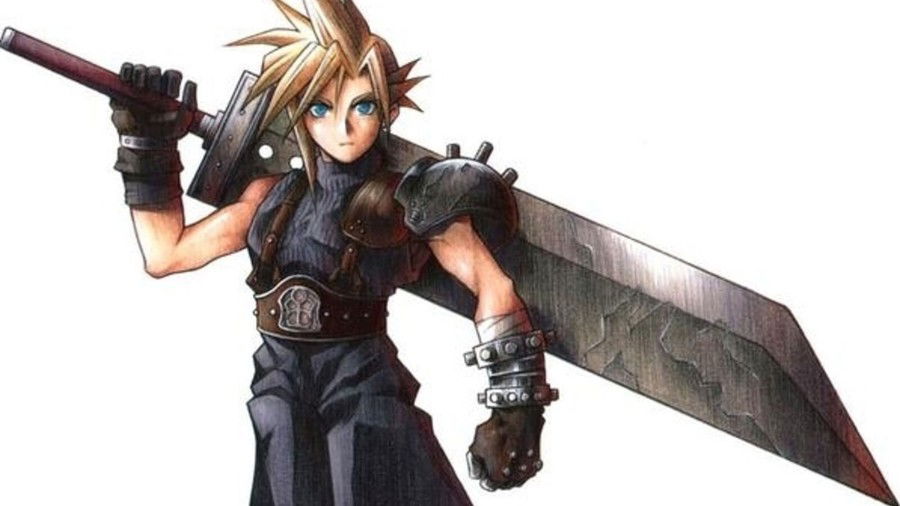
While the visuals leverage their personalities, their development is what makes them fascinating, and Cloud is the prime example of this. When you're introduced to him, we see an Ex-Soldier wielding a giant sword who became a mercenary, but as the plot unfolds, the more you learn about him: Cloud was by Sephiroth's side years before the start of the game when he returned to his hometown in Nibelheim. But after the villain discovers his origin, that he was genetically modified with the cells of an alleged Ancient named Jenova, Sephiroth becomes a megalomaniac, burning down Cloud's hometown, killing its residents, and is presumed dead after that day.
With his reappearance, the villain becomes the primary target for Cloud and his journey is based on finding him, and the closer we get to the confrontation between the two, the more something feels wrong with the protagonist, his stories seems less coherent and his obsession seems less natural as it becomes clearer that there is something hidden in their relationship.
The series of events that ensue from the search for the antagonist lead the player to question who Cloud really is, when not even he knows how to answer that question. With all the truths we are told about him becoming questionable, leaving us in the dark and putting us in the shoes and helplessness of an unreliable character of which we have no absolute control over, was one of the most ingenious ideas of Final Fantasy VII — and coupled with excellent character development, make Cloud one of the best protagonists in the franchise.
And the most interesting part is that, despite being the most active part of the story. Cloud isn't one of the forces that moves the plot, let alone the best character in the game.
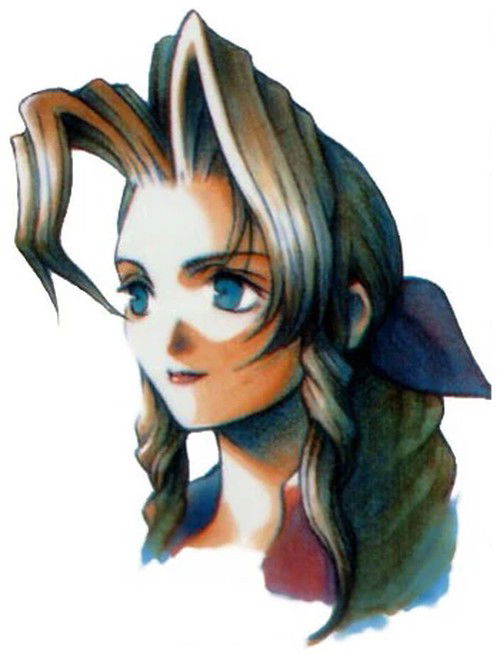
The best character in the game and the main force that drives its story is Aerith. Everything ultimately revolves around her and Sephiroth, even when it's Cloud who you control and tells the group where to go. And to represent her importance, she's the first image you see in the game, and the last one before the end credits — Aerith is the main medium that connects the beginning, the end, and everything in between in Final Fantasy VII.
Unlike how Cloud leads us to question his identity, Aerith shows us from her first dialogue who she is: despite her role as the team's "healer", she escapes this famous stereotype by, despite being kind, having a straightforward, honest personality where she often says things as she thinks without any fear of how others will react, and this sincere but caring way makes her connect with the other characters and develop bonds with them.
The way she was purposefully designed and developed makes not only her other teammates, but also the player themselves connect and care about Aerith's existence — making her absence even more impactful for the main theme addressed by the game, as we will discuss further below.
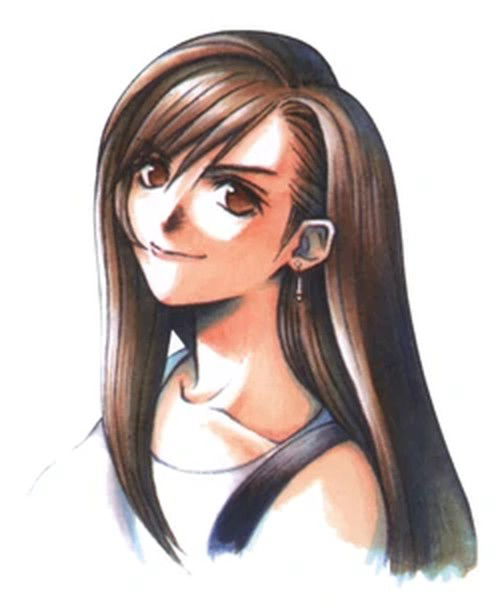
Tifa is the one who ends up taking the role of the protagonist's emotionally attached character, but not to the point that this is her only personality trait or as if her existence in the plot depended solely on Cloud. As her role as a "fighter" indicates, Tifa is a strong character that can handle a variety of situations on her own.
However, the relationship between her and Cloud isn't your standard '90s romantic hookup — in fact, at least on-screen, they never become romantically intimate — and there's a sort of rational logic to her attachment: Tifa grew up and lived in Nibelheim, was present during the tragedy caused by Sephiroth, lost the rest of her family, and that loss definitely traumatized her.
Therefore, she sees in her childhood friend a remnant of what she lost in Nibelheim—Cloud is, for Tifa, the vestige of the only home she has ever had, and her development revolves around her fear of losing that little remnant of her childhood memories, while trying to indicate that there is something wrong with him and with the stories he tells, turning her into an important piece in the search for the protagonist's identity.
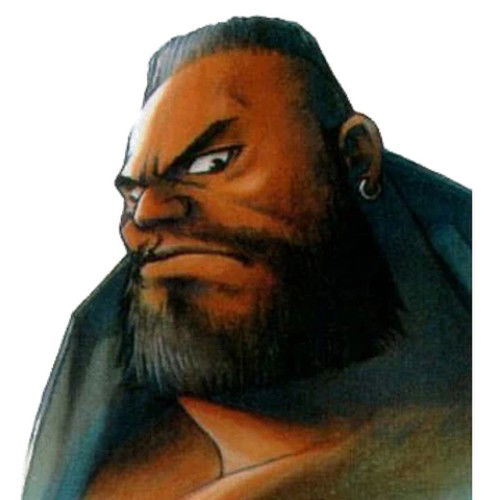
Barret, Final Fantasy's first black character, ends up falling into a mixed and conflicted role: on the one hand, he is too stereotyped as an aggressive, foul-mouthed man with radical ideals. After all, he's the leader of an eco-terrorist group that decided to blow up a reactor to deactivate it early in the game. He is also an affectionate man who truly cares for his teammates and especially his daughter, Marlene.
In other words, Barret is the typical case of the "tough guy with a soft heart" — but he also portrays a person trying to cope with and overcome the trauma of losing their home to the tyranny of a megacorporation and resorting to radical measures to do so that, ultimately, they end up causing the death of their fellow Avalanche partners and the destruction of Sector 7 — adding to the weight of his guilt and the challenge of overcoming grief.
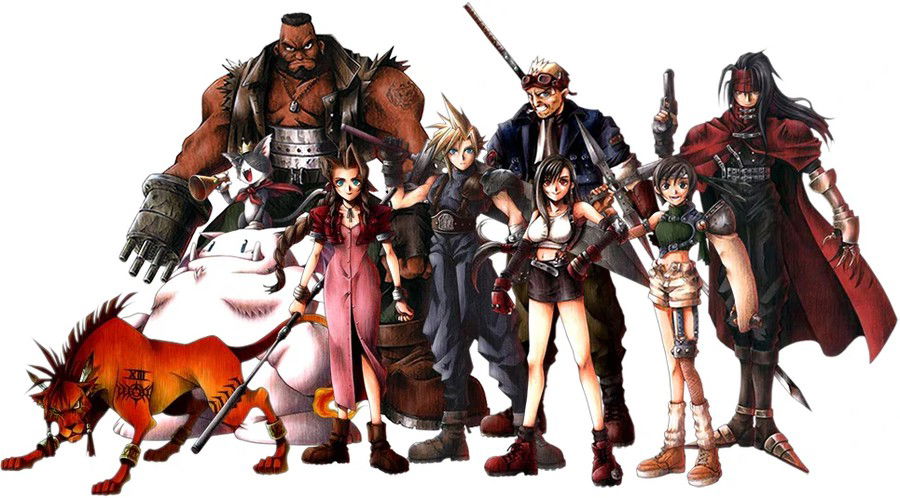
As for the others, the truth is that the execution of their personal issues is terrible: Yuffie's dilemma, for example, addresses a rather important theme, but the way the game works it is so bad that the only impression left on her is that she is a Materia thief who is in the party merely out of interest.
Vincent talks about living with a mistake he was unable to avoid to the point of being in constant penance, but it lacks depth. Cait Sith was supposed to portray dilemmas like betrayal and values, but it ends up being just an irritating stuffy puppet, and Red XIII's arc lasts so short that it doesn't leave any room for him to grow in the story.
But Cid is by far the worst execution of a character in the PlayStation 1 era of Final Fantasy: he was supposed to portray a cantankerous man who had his dreams dashed by Shinra because his projects weren't profitable enough, and spends life brooding over that as he revisited the rocket that would take him into space daily. Instead, Cid channels his frustration on Shera, and all we see from that is an abusive relationship that, while not a subject of debate in 1997, is definitely not acceptable by 2022 societal standards.
It's not that Cid lacks development: he demonstrates exemplary qualities at the helm of Highwind, but any good points that exist in the character are overshadowed by the abusive way he acts towards Shera when we are introduced to him.
Sephiroth — The most iconic villain in the entire franchise
If you ask someone the name of a Final Fantasy villain, the first one that probably comes to their mind is Sephiroth.
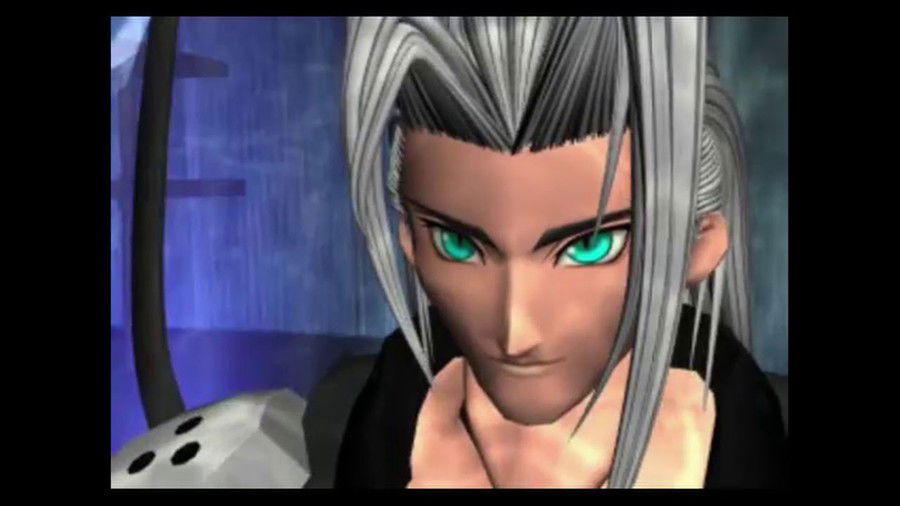
The antagonist differs from its predecessors and has opened up a whole new level of what the villain of a video game and other media could look like and act. His influence was present for decades and remains to this day in the mainstream culture.
A recurring pattern in the first generation of Final Fantasy was that its villains looked bad — they wore heavy armor, commonly had only a humanoid form without being human, and/or had personality traits that screamed, "hey, that's the bad guy", like Kefka Palazzo's maniacal laugh in FFVI.
Sephiroth avoids this recurrence in the series: his look harks back to his earlier fame as a war hero — long silver hair, wearing black attire with silver accessories, wielding a katana that only he knows how to handle — and the fact that the player spends the story chasing him instead of him just committing evil deeds while hiding in his impenetrable castle, or while marching into world domination with an army, end up making him much more threatening every single time he shows up.
The flashback sequence is a great device to give you an idea of how powerful he is compared to the party at that moment: this is the first time the player sees Sephiroth and what he looks like, and there's no better way of understanding a villain's grandeur than actively putting him in your AI-controlled party, using higher level spells to eliminate enemies in a single turn that Cloud can't even survive an attack from. By having such a powerful and yet tangible character stats during that flashback scene was a perfect visual demonstration.
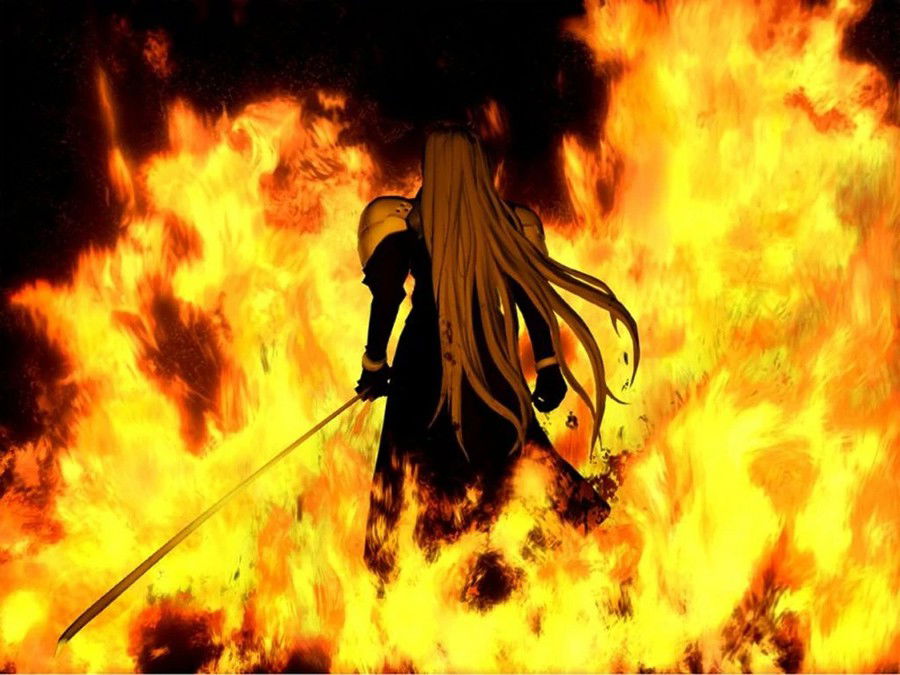
The famous cutscene in which he turns his back and disappears into the flames of a burning Nibelheim is an image that is etched in the player's mind and added to the low frequency of direct dialogues with Sephiroth during the plot - thus avoiding the overexposure that would make him psychologically less dangerous for each time it appeared on-screen without anything important happening — and always accompanied by its fearful theme song, establishes an imposing mental image to the player.
Another striking point of the villain is how he is surrounded by mysteries: How did he survive? What does he plan? Where is he going? What is the real relationship between him and Cloud? His mere existence raises numerous questions for the player and the other characters, and his intentions are unclear until later in the game, as he isn't actively carrying out atrocities, but rather quietly pursuing his own agenda.
All this, coupled with the fact that he starred in one of the most remarkable scenes in the video game history, make Sephiroth a common figure in the popular imagination and a memorable villain of the franchise.
Aerith and the Five Stages of Grief
The goal in writing articles like this is to bring interesting content both to fans and to those who have never heard of or have never actually played the game. Therefore, care is taken to avoid revealing too many details about the plot and to approach the main themes in a perspective focused on what the title wants to convey to the player.
One of the messages that Final Fantasy VII seeks to convey concerns life and what happens in it while we exist and when we leave. It was designed to build a message about life in a logical and collective concept, seeking to give a comforting answer about what is beyond material existence with its own interpretation of spiritual topics, such as soul or reincarnation — It's impossible not to address this topic in the article, and there's no way to explain the depth of it without mentioning the most important part of Final Fantasy VII, so I feel it's my duty to warn you that the text from this moment on enters what can be considered the spoilers zone.
Spoiler Zone
As we know, death is a natural part of what we call life. The only certainty we have is that we are born, exist and will eventually leave this world – and working to give meaning to death has been a common element in artistic ends since the early concepts of theater, passing through cinema and, of course, the world of video games.
However, in a universe like the 90s RPGs, where the stories were based on the hero's journeys and narratives that differed from these were still being explored, talking about death in an unconventional way was complicated, to say the least. And even in many games today, portraying the moment where an important character ceases to exist is an arduous task and often falls into clichés, or lacks enough emotional depth for you to care — even some newer titles suffer in depicting the loss of a loved one, like in Noctis' reaction to the death of his father, Regis, at the beginning of Final Fantasy XV.
Typically, a character's demise was due to a heroic sacrifice to save their friends, or was telegraphed before actually happening through dialogue, and had minimal consequences on the game's experience to the point of being irrelevant when it happened with a temporary party member — Previous games like Final Fantasy IV and Final Fantasy V made the character come back later, or made their passing less relevant both in technical and narrative terms by immediately replacing them with another character with the same abilities. Even Chrono Trigger, hailed as the best RPG of all time and which had the audacity to kill the main character, mitigates the consequences of this by giving you an optional quest to bring him back.
FFVII recurrently addresses grief, if not literal, metaphorical: Cloud, Tifa, Barret, Vincent and others have a past involving loss and how it defined who they became and what their goals are. The game treats this theme as a permanent and striking issue in a person's life. So, by making death an irreversible, mechanically punitive, and emotionally impactful act, FFVII expanded the boundaries of how a video game could go by depicting the stages of grief.
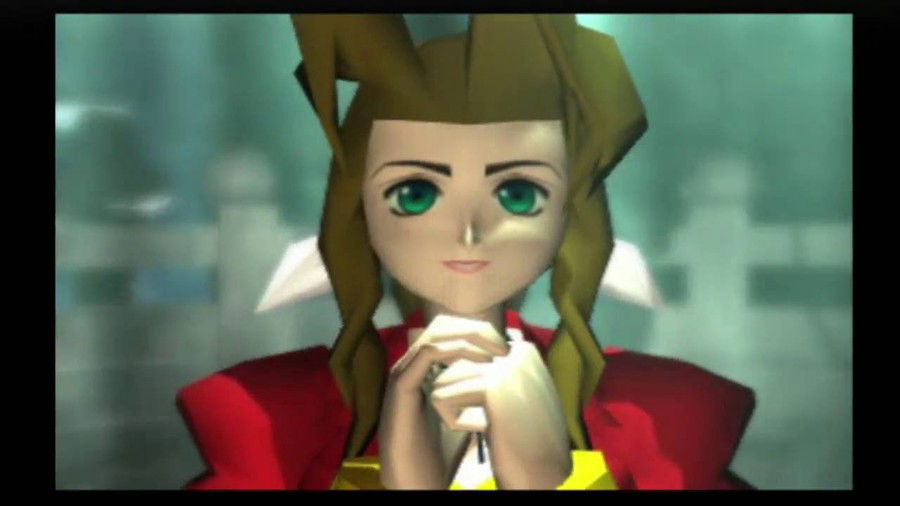
As I mentioned above, Aerith is the best character in the story for being one of the gears that moves it, for her personality and connection she establishes with others, and how she was meticulously designed to make you care about her existence.
The interactive decisions you make with Cloud directly affect others, and many of these dialogues take place in Aerith's presence. If you go with the natural cycle of things, she is the one you have the Gold Saucer cutscene with, and her Limit Breaks makes Aerith an important and irreplaceable resource. That's why her death is the most shattering moment in the game, and its execution is incredibly orchestrated.
Most deaths in RPGs up to this point were announced through an act, dialogue or even a farewell before the fateful moment and either gave you a feeling of predictability or prepared you for that moment. But FFVII never intrinsically tells you "this character is gonna die", and Aerith doesn't even once hint that she might die later on. So, when her death just happens, it manages to portray the shock and sorrow of grief as realistically as possible for the time.
In real life, when we lose someone, we usually just get the news that that person is gone, and it devastates us like a shock wave that reverberates through our body for several days, months or even years. We don't usually have time to say goodbye, to apologize for times we've hurt them, or to enjoy a last moment together. That person is gone, forever.
Final Fantasy VII portrays death as an unannounced thing that takes the people we love from us, and all we have left in that space of time when we get the news and absorb its information is an expansive feeling of desolation as our minds and hearts try to process the facts. And it does so not only by suddenly taking Aerith from the player, but by greatly executing a sequence that lasts around 10 minutes: while her theme song now plays with a melancholic tone, Cloud holds her body after Sephiroth's fatal blow, and his first words are:
“This can't be real. Aerith is gone. Aerith will no longer talk, no longer laugh, cry, or get angry. What about us? What are WE supposed to do? My fingers are tingling, my mouth It's dry, my eyes are burning!”
- Cloud Strife
If you've ever lost someone important at some point, you probably understand how relatable Cloud's words at that moment are — they describe the exact moment of shock to know that person is no longer present in this world — and just like in real life, where we often don't have the time to process everything and need to get on with our lives, the game starts a boss battle while Aerith's theme still plays, reminding us of what just happened while you, perhaps reflecting your anger and anguish in Cloud's attacks, still have the hope that after defeating Jenova, she will be saved, or that it wasn't real and that in the end everything will be fine. The game, at this point, is playing with our perception of the first three stages of grief: denial, anger and bargaining.
However, it's when the battle is over that you - through the party - realize that Aerith is truly dead, with each of them wailing in their own way: Cid's reaction of looking up to the sky, Red XIII howling for her as he did to his father, Barret looking down at the floor as if feeling anger and frustration at losing another loved one, the natural reaction of a teenager like Yuffie to burst into tears, and even the awkward dance Cait Sith does in a futile attempt to liven things up just to realize there is no way to make that moment less bad demonstrate their pain in the face of such calamity, and add a great emotional impact to the moment.
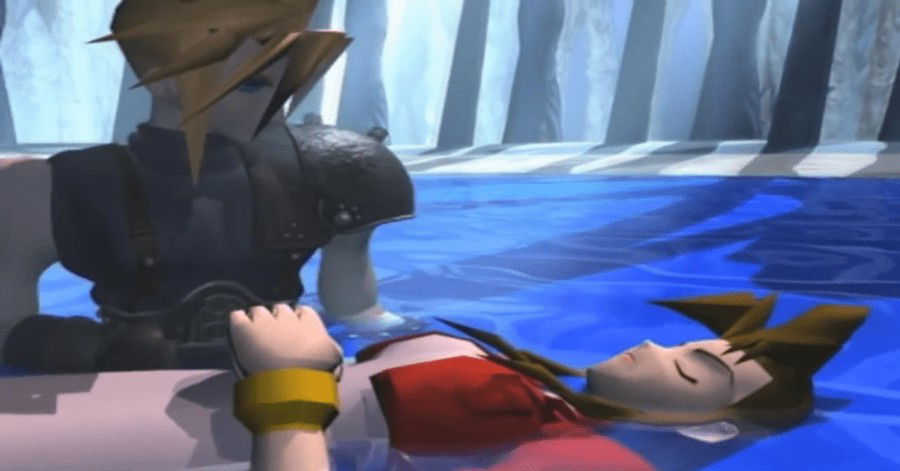
In the end, just as family and friends carry the coffins of their loved ones, it's up to Cloud to carry Aerith's body and take her to the lake, where we watch her sink and disappear into the depths — and this, like when we bury someone, is the player's last contact with Aerith.
By portraying a moment of loss and grief in such a real and detailed way despite the graphical limitations and without trying to attribute such tragedy as an act of sacrifice or heroism, Aerith's death has become one of the most famous scenes in the video game universe to date.
And when the next scene begins, Final Fantasy VII is no longer the same. You feel something is missing, you feel that everything around you has changed, and you are surrounded by a bitter feeling as the story takes a darker turn, taking us to the stage of depression.
But it's not all about doom and gloom
After all, Final Fantasy VII is designed to give meaning to death and what happens after it, and executes that concept through the idea that everything returns to the Planet as a collective of souls that sustain the origin of life. The game is careful not to turn this concept into a kind of "afterlife" where Aerith's spirit communicates directly with Cloud and the others, since that would remove the importance of the message the story tries to convey in relation to grief.
Instead, the game guides us to the fifth and final stage — the acceptance — and does so by demonstrating that, despite her no longer being present, what she sought to do to save the Planet still matters. Aerith continues to move the story, even though she is no longer a tangible part of it.
There's an intriguing take on this last stage here: Final Fantasy VII doesn't try to simplify grief in terms like "the deeds of the departed and the memories they left are what matter." On the contrary, there is virtually no flashback moment with Aerith precisely to prevent its message that acceptance in grief is about letting go from being misinterpreted.
The last part of Final Fantasy VII is precisely about finishing what Aerith started to let her rest in peace. Even if applied in a metaphorical and fantastic way — after all it is a sci-fi work — the last step of the journey portrays, in a world where many of those who are presented to us are haunted by unresolved questions in relation to those who are gone, the need to not hold on to memories and live in the shadows of your loss to reach the stage of acceptance and thus be able to move on and pave your own path despite the ones you lost.
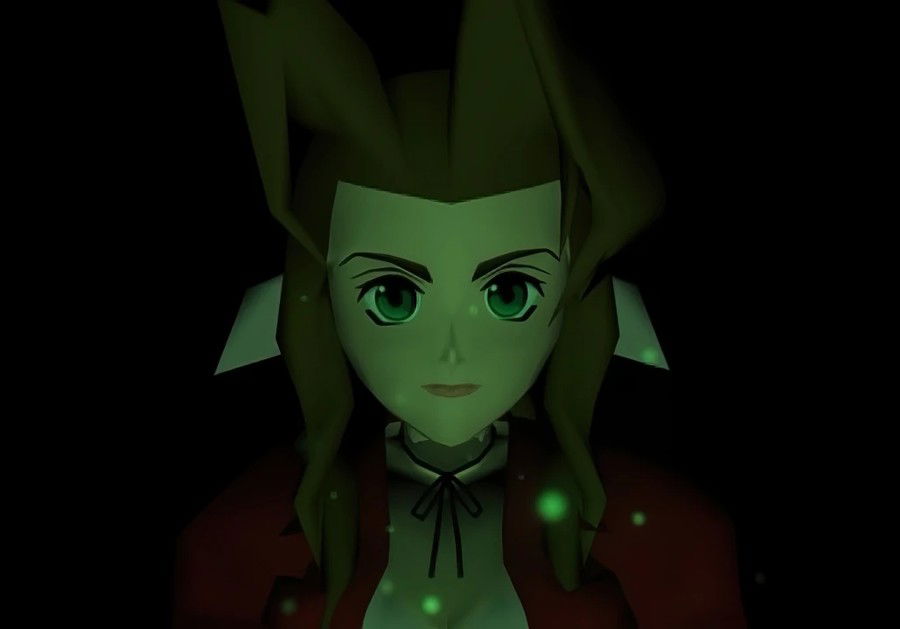
By helping Aerith join the Lifestream, and saving the planet in the process, Final Fantasy VII wraps up a long, detailed and powerful narrative about life as a collective concept and overcoming grief, and paves the way for Cloud, Tifa, Barret, Red XIII and others to find peace of mind over their losses, freeing themselves from the bonds created by their memories and guilt.
Finding peace of mind over your own grief is a recurring theme in subsequent releases of the Compilation of Final Fantasy VII: Advent Children and Dirge of Cerberus also work with the idea of letting go of the ghosts of your past, and it won't surprise me if the future Final Fantasy VII — Rebirth brings these themes to the center of its reworked universe.
Conclusion
We finally reached the end of this article.
Honestly, it was longer than I initially expected, but it's impossible to talk about Final Fantasy VII and its narrative importance without touching on so many themes from an information-rich world that shaped an entire generation of games and brought for many some of the best memories of their childhoods and awakened in so many people a passion for the RPG genre.
I would like to recommend Polygon's Final Fantasy VII: An Oral Story, published in 2017 and which served as a reference for most topics I tried to work on here.
I also intend to delve into the reworked universe of FFVII in the near future, starting with the Remake and its DLC, Intermission. And from that point on, we'll be able to address theories and expectations for FFVII: Rebirth, planned to come out in the last quarter of 2023.
Thanks for reading!

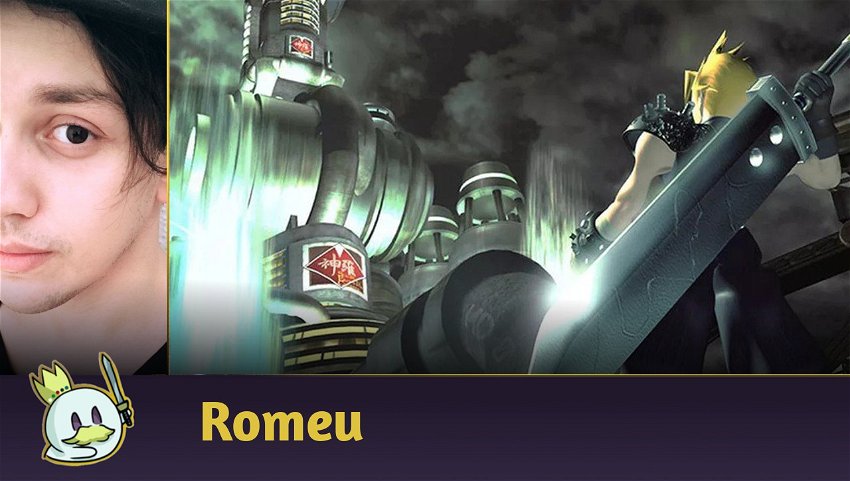






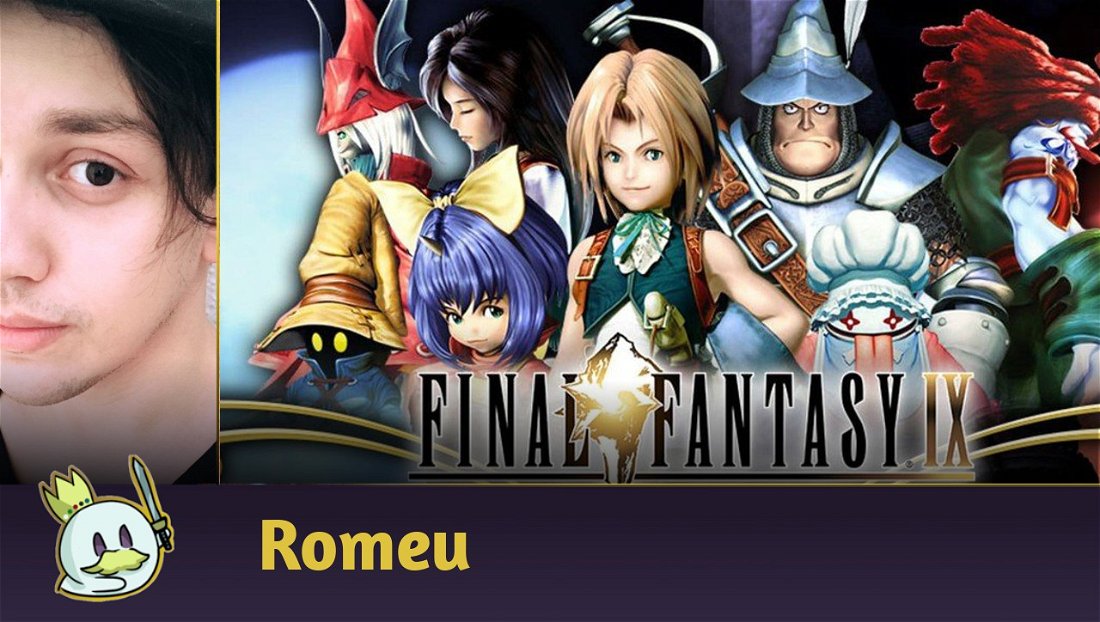
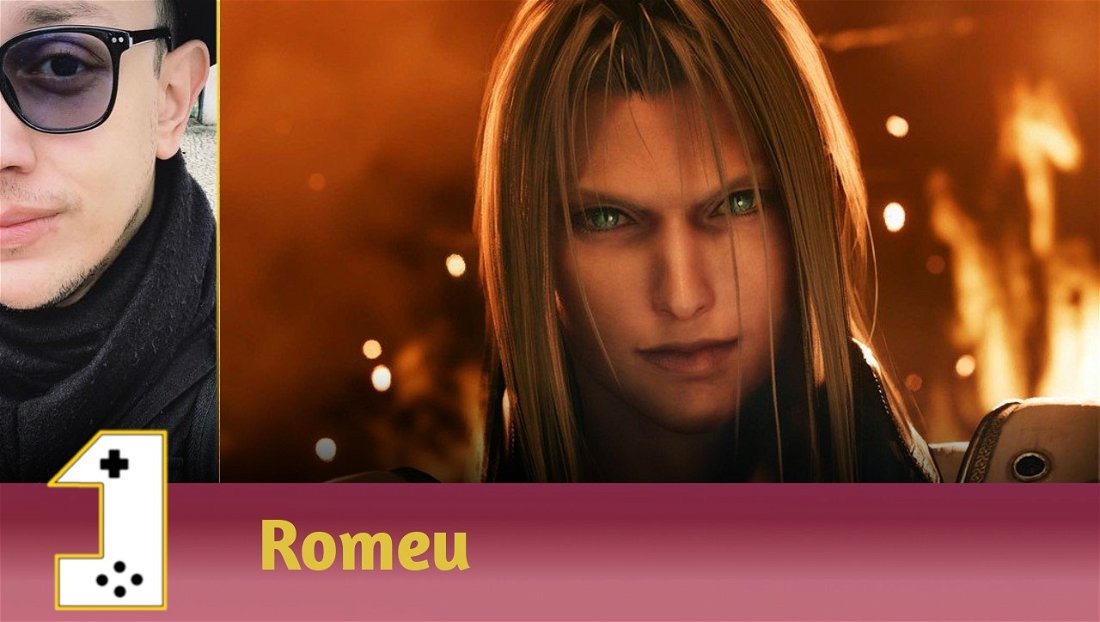



— commentaires 0
, Réactions 1
Soyez le premier à commenter